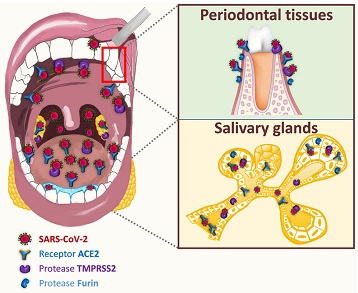BREAKING! U.S. Scientists Say That SARS-CoV-2 Can Hide In Salivary Glands And Maybe Even Cause Relapses Or Reinfection! U.S.NIH Funds New Research
Source: SARS-CoV-2 Research Oct 30, 2021 3 years, 5 months, 2 weeks, 4 days, 19 hours, 26 minutes ago
American scientists from the University of Utah Health are leading a new urgent effort to determine if salivary glands infected with the SARS-CoV-2 virus that causes COVID-19 could diminish a person's long-term immunity to the disease after being immunized or after recovering from the illness. Th new study aims to clarify after many researchers are sounding new alarms that the SARS-CoV-2 could be hiding in the salivary glands and that these reservoirs could cause relapses or reinfections.

The U.S. NIH (National Institutes of Health) has immediately sponsored an urgent research involving a two-year grant to the University of Utah Health on the issue.
Dr Melodie Weller, Ph.D., an assistant professor of dentistry at University of Utah Health who is leading the new study told
Thailand Medical News, “Typically viruses like SARS-CoV-2 are commonly found in salivary glands. How SARS-CoV-2 gets there, though, is still a mystery. Typically, viruses can enter the salivary glands through the moist inner lining of the oral cavity, called mucosa, or travel there via the bloodstream.”
She added, “Like some other parts of the body, the salivary glands have what is known as "immune privilege," meaning that even though they are infected, the immune system may not effectively clear pathogens within the glands. As a result, the salivary glands can be a lingering repository for viruses such as SARS-CoV-2 and other viruses.”
Dr Weller further added, “It has been known that proteins that we are exposed to in our digestive tract can trigger what is called ‘oral tolerance.’ As a result, our immune system won't produce antibodies to these proteins, such as those in the foods that we eat. However, because viruses contain proteins, they too may be overlooked by the immune system in the gastrointestinal tract. If viral proteins are released into the saliva and we swallow a lot of saliva every day, then they may have the capacity to decrease our ability to make antibodies."
“Alarmingly that can have an impact on how long immunity will last. So, the better we can understand the role of SARS-CoV-2 in the salivary glands, the better we'll understand how reinfection and breakthrough infections after immunization are occurring during this pandemic," Dr Weller added.
The study team from University of Utah Health suspect that SARS-CoV-2 released from the salivary glands may inhibit the production of antibodies and, as a result, increase the risk of relapse or reinfection. They also could limit the long-term effectiveness of vaccines.
Dr Weller and colleagues are testing this hypothesis in mice, expressing SARS-CoV-2 viral proteins in the salivary glands. They plan to vaccinate these animals to see how they respond.
Dr Weller added, "If they're getting viral protein exposure in the gut through swallowing saliva, then we will likely see a decrease in immunity or a decrease in the duration of the immune response.”
To date numerous studies already confirm and show that the SARS-CoV-2 coronavirus can attack and replicate inside the salivary glands.
ttps://www.nature.com/articles/s41591-021-01296-8">https://www.nature.com/articles/s41591-021-01296-8
https://pubmed.ncbi.nlm.nih.gov/33834497/
https://onlinelibrary.wiley.com/doi/10.1002/path.5679
https://www.ijodontostomatology.com/en/articulo/potential-affection-of-the-salivary-glands-in-infection-by-sars-cov-2-covid-19/
https://www.sciencedirect.com/science/article/pii/S1882761621000144
Studies also showed that the salivary glands were potential reservoirs for the virus to remain in the human host body for longer than expected periods of time.
https://pubmed.ncbi.nlm.nih.gov/32271653/
https://www.medrxiv.org/content/10.1101/2021.10.08.21262462v1.full
For more on the results of this new study as it progresses, keep on logging to Thailand Medical News.
